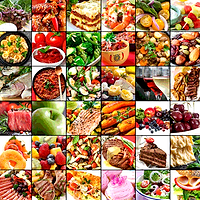For the second consecutive year, Food Safety Magazine has tracked food product recalls issued in the U.S. and Canada. Just as in 2015, we cannot guarantee that our list includes every single recall that was issued--it’s always possible that some fly under the radar. But the following summary includes what we have been able to conclude based on notices issued by the U.S. Food and Drug Administration, the U.S. Department of Agriculture’s Food Safety and Inspection Service and the Canadian Food Inspection Agency.
For 2016, we counted 764 food recalls, a 22 percent surge compared to 2015. Two of the main culprits were undeclared allergens, along with Listeria contamination.
Undeclared Allergens
 Foods recalled for undeclared allergens has once again caused more food recalls than any other form of contamination, 305 recalls to be exact. The largest offenders include milk, eggs, peanuts and wheat.
Foods recalled for undeclared allergens has once again caused more food recalls than any other form of contamination, 305 recalls to be exact. The largest offenders include milk, eggs, peanuts and wheat.
- Milk - 101 recalls in 2016 vs. 82 recalls in 2015
- Eggs - 82 recalls in 2016 vs. 42 recalls in 2015
- Peanuts - 51 recalls in 2016 vs. 49 recalls in 2015
- Wheat - 40 recalls in 2016 vs. 34 recalls in 2015
A smaller--but still significant--number of recalls were also issued for other allergens, primarily soy and various tree nuts.
Listeria
 The food industry is well aware that Listeria is a headache that just doesn’t seem to go away. In 2016, 196 recalls were attributed to Listeria contamination. A staggering number of these--over 50--were due to sunflower seeds and products containing sunflower kernels throughout the second quarter. Various recalls were issued by Kashi, General Mills, Hershey, Atkins, Quaker, Publix, Kroger and dozens of other companies. Recalled products included trail mixes, protein, energy and granola bars, nut butters and salad toppings.
The food industry is well aware that Listeria is a headache that just doesn’t seem to go away. In 2016, 196 recalls were attributed to Listeria contamination. A staggering number of these--over 50--were due to sunflower seeds and products containing sunflower kernels throughout the second quarter. Various recalls were issued by Kashi, General Mills, Hershey, Atkins, Quaker, Publix, Kroger and dozens of other companies. Recalled products included trail mixes, protein, energy and granola bars, nut butters and salad toppings.
To a lesser extent but also in the second quarter, nearly 30 recalls were issued after frozen vegetables and fruits were flagged for Listeria contamination. Although Pasco, WA-based CRF Frozen Foods issued a number of notices for its frozen organic and traditional fruits and vegetables, their announcement trickled down to a number of brands their products were sold under--Kroger, Publix, Hy-Vee, Trader Joe’s, Target and Walmart, among others. CRF says that the recall included approximately 358 consumer products sold under 42 separate brand names.[1]
Foreign Matter Contamination
 Pieces of glass, metal, plastic, rubber and wood certainly had an impact on last year’s food recalls. A total of 44 foreign matter recalls were tallied in 2016. While most were due to the aforementioned materials, one stood out for the presence of sand and black soil while two others had unidentified foreign materials. Foods affected by these recalls included everything from meat to fruit to ice cream. What do these recalls mean? One on hand, it could be a sign that more food companies are investing in the right tools (metal detectors, X-ray machines, etc.) to detect contaminants. But it could also be quite the opposite--food processing mistakes are occurring more frequently.
Pieces of glass, metal, plastic, rubber and wood certainly had an impact on last year’s food recalls. A total of 44 foreign matter recalls were tallied in 2016. While most were due to the aforementioned materials, one stood out for the presence of sand and black soil while two others had unidentified foreign materials. Foods affected by these recalls included everything from meat to fruit to ice cream. What do these recalls mean? One on hand, it could be a sign that more food companies are investing in the right tools (metal detectors, X-ray machines, etc.) to detect contaminants. But it could also be quite the opposite--food processing mistakes are occurring more frequently.
Pilgrim’s Pride--The Waco, TX-based chicken producer issued a number of recalls after discovering that some fully cooked chicken products may have been contaminated with extraneous materials--metal, plastic, rubber and wood. The first recall, issued on April 7, 2016, recalled 40,780 pounds of product. That was followed by a notice on April 26 that recalled an additional 4.5 million pounds of chicken products. On May 6, another 608,764 pounds was added to the list. This was followed by another 376,380 pounds of recalled product announced on May 19. The total weight of Pilgrim’s Pride recalled product was over 5.5 million pounds. The implicated chicken nuggets and patties were sold under various brand names--Gold Kist Farms, Pierce Chicken and Sweet Georgia. The initial recall was prompted after several consumer complaints were logged, and additional recalls were issued after consumer complaints continued to roll in. At the time of the recalls there were no reported adverse reactions, illnesses or injuries in relation to the recall.[2, 3]
Other notable foreign contamination recalls in 2016 include the following:
Nestle USA--In March, the Swiss food and beverage company recalled more than 267,000 pounds of frozen food products. Two different Nestle products--Digiorno Pizza and Stouffer’s chicken lasagna--were both pulled from shelves nationwide after multiple consumer complaints regarding small pieces of glass found in the frozen food products.[4]
Foster Farms--Based in Livingston, CA, the well-known poultry processor recalled approximately 220,450 pounds of fully cooked frozen chicken nuggets last April due to extraneous materials, specifically blue plastic and black rubber materials.[5]
ConAgra--In July, the Chicago, IL-based food company that boasts many iconic brands issued two recalls for its P.F. Chang’s frozen chicken and beef entree products, totalling 195,597 pounds of food. The foreign contamination included curled, shiny, malleable metal fragments ranging in size between 2 and 9 millimeters in diameter.[6]
Tyson Foods--The Springdale, AR-based meat company recalled 132,520 pounds of fully cooked chicken nugget products in September due to the presence of hard plastic first discovered by consumers. The metal pieces measured between 21 mm long and 6.5 mm wide. Tyson believes the plastic may have come from a plastic rod used to connect a plastic transfer belt, saying that the products pass through a metal detector, but the plastic is not detectable via that technology.[7]
Salmonella
A total of 99 Salmonella-related food recalls were tallied for all of 2016. Most of these were attributed to contaminated nuts, primarily pistachios, macadamia nuts and derived products. In March, Lost Hills, CA-based Wonderful Pistachios recalled various flavors and sizes of both in-shell and shelled pistachios due to Salmonella contamination. The nuts were sold in the U.S. Canada, Mexico and Peru under a variety of popular brand names--Wonderful, Paramount Farms and Trader Joe’s. Two specific strains of Salmonella--Montevideo and Senftenberg--sickened at least 11 individuals in Connecticut, Georgia, Massachusetts, Michigan, Minnesota, New York, North Dakota, Virginia and Washington.[8]
Escherichia coli
Thirty-one E. coli recalls were tallied for 2016, more than half of them occurring in the third quarter. For the most part, beef products were mostly to blame (four recalls total), followed by pork products (three recalls total). The most well-known of last year’s E. coli recalls was issued in May by food giant General Mills. The company’s Gold Medal and Signature Kitchens flour brands were pulled from shelves after 38 individuals became ill with E. coli. Oddly, at the time of the recall, the E. coli O121 strain had not been detected in any of General Mills’ flour brands nor was it found in the company’s manufacturing plant despite the reports of sickened consumers.
Big Names Issue Recalls
In January 2016, Dole Fresh Vegetables recalled it’s branded and private label packaged salads processed in its Springfield, OH facility due to the possibility of Listeria contamination. In fact, operations at the Ohio production plant were temporarily suspended as a result of the recall.[9]
Bumble Bee Foods recalled over 31,000 cases of its popular canned chunk light tuna in March 2016. The cause, according to the company, was “accidental deviation in the sterilization process” that could result in spoilage or the growth of dangerous pathogens. The process deviation reportedly occurred in a co-packing facility not owned or operated by Bumble Bee itself.[10]
Hostess Brands recalled 710,000 cases of certain snack cakes and donuts in June due to undeclared peanut residue in the flour supplied by a third party.[11]
Kellogg Company voluntarily recalled 10,000 cases of its Eggo Nutri-Grain Whole Wheat Waffles in September 2016. The frozen breakfast foods were potentially contaminated with Listeria.[12]
Sabra Dipping Company recalled some of their hummus products in November after concerns surfaced over the presence of Listeria found in a manufacturing facility, but not in any tested finished product.[13]
It is clear that food recalls occur due to a number of reasons--inadequate food production and monitoring processes, failure to maintain food processing facilities and equipment, noncompliance with various federal food safety regulations, inability to track products and ingredients through a complex supply chain--the list goes on. So what can food companies do to curb these incidents? Be proactive. Invest in the tools needed now to prevent negative impacts on consumers, employees and the bottom line in the future.
Tiffany Maberry is Food Safety Magazine's digital editor.
More on food recalls:
A Look Back at 2015 Food Recalls
Undeclared Allergens and Automation: The Crossroad of Food Safety and the Reduction of Recalls
Ready-to-Eat Foods: Preserving the Trust of the Consumer
Listeria, Salmonella and Escherichia coli: Oh My!
Avoiding Allergens: It's the Right Thing to Do
Protecting Your Customers from Foodborne Illness
Food Recalls from the Perspective of the Retailer
References
1. http://crffrozenfoods.com/recall-press-release/.
2. https://www.fsis.usda.gov/wps/wcm/connect/FSIS-Content/internet/main/topics/recalls-and-public-health-alerts/recall-case-archive/archive/2016/recall-027-2016-expanded.
3. https://www.fsis.usda.gov/wps/wcm/connect/FSIS-Content/internet/main/topics/recalls-and-public-health-alerts/recall-case-archive/archive/2016/recall-027-2016-release-expansion?.
4. https://www.fsis.usda.gov/wps/wcm/connect/FSIS-Content/internet/main/topics/recalls-and-public-health-alerts/recall-case-archive/archive/2016/recall-024-2016-release?.
5. https://www.fsis.usda.gov/wps/wcm/connect/FSIS-Content/internet/main/topics/recalls-and-public-health-alerts/recall-case-archive/archive/2016/recall-033-2016?.
6. https://www.fsis.usda.gov/wps/wcm/connect/FSIS-Content/internet/main/topics/recalls-and-public-health-alerts/recall-case-archive/archive/2016/recall-056-2016-release-expansion?.
7. https://www.fsis.usda.gov/wps/portal/fsis/topics/recalls-and-public-health-alerts/recall-case-archive/archive/2016/recall-089-2016-release?.
8. https://www.cdc.gov/salmonella/montevideo-03-16/map.html?.
9. http://www.fda.gov/Safety/Recalls/ucm482822.htm#recall-photos.
10. http://www.fda.gov/Safety/Recalls/ucm491107.htm?.
11. http://www.fda.gov/Safety/Recalls/ucm505065.htm#recall-photos?.
12. http://www.fda.gov/Safety/Recalls/ucm521434.htm#recall-photos?.
13. http://www.fda.gov/Safety/Recalls/ucm529967.htm#recall-photos?.




